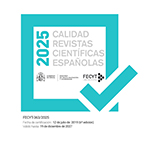'La casa de papel', 'Rita' y 'Merlí': entre nuevas narrativas y viejos patriarcados
Resumen
Netflix ha venido desafiando, en cierta forma, algunos de los roles tradicionales que ocupan las mujeres en los medios de comunicación. Ha incorporado series que han buscado desestabilizar los estereotipos sexistas clásicos para proponer nuevos protagonismos, otras miradas y diversas posibilidades de ser heroínas. En este artículo trabajamos con tres series que presentan nuevas perspectivas narrativas para mujeres y que centralizan gran parte del argumento en ellas: Rita, La Casa de Papel y Merlí. Se trata de tres historias creadas por fuera de las producciones imperialistas e, incluso, del idioma inglés. A partir de un Análisis Crítico del Discurso pautado por la metodología feminista, analizamos las construcciones de mujeres que se presentan en estas ficciones, así como los estereotipos sexistas que se ponen en juego, se desafían y se formulan en el marco de estos tres programas. Desde el análisis de contenido mediático, nos centramos en las representaciones sociales de género que se producen y se concretan en la nueva apuesta de la industria cultural.
A pesar de que estas series parecen atender a nuevas demandas de la sociedad, incorporando personajes y narrativas que apelan a la diversidad y a la contestación, es posible sugerir que ese movimiento se dirige más a atraer nichos de mercado en la industria del entretenimiento que a proponer una crítica social más amplia y profunda.
Descargas
Descarga artículo
Licencia
La revista Investigaciones Feministas, para fomentar el intercambio global del conocimiento, facilita el acceso sin restricciones a sus contenidos desde el momento de su publicación en la presente edición electrónica, y por eso es una revista de acceso abierto. Los originales publicados en esta revista son propiedad de la Universidad Complutense de Madrid y es obligatorio citar su procedencia en cualquier reproducción total o parcial. Todos los contenidos se distribuyen bajo una licencia de uso y distribución Creative Commons Reconocimiento 4.0 (CC BY 4.0). Esta circunstancia ha de hacerse constar expresamente de esta forma cuando sea necesario. Puede consultar la versión informativa y el texto legal de la licencia.











